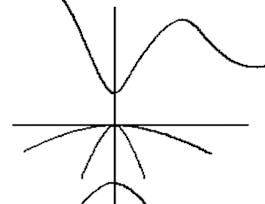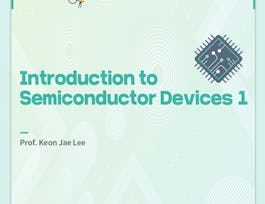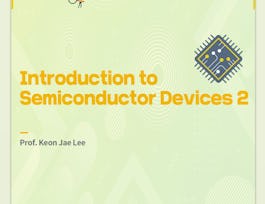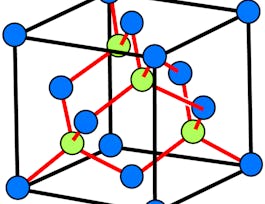This course can also be taken for academic credit as ECEA 5631, part of CU Boulder’s Master of Science in Electrical Engineering degree.



Diode - pn Junction and Metal Semiconductor Contact
This course is part of Semiconductor Devices Specialization

Instructor: Wounjhang Park
Sponsored by Coursera Learning Team
12,478 already enrolled
(275 reviews)
What you'll learn
Analyze pn junction at equilibrium and under bias, capacitance and current characteristics, and breakdown behavior
Analyze metal-semiconductor contact at equilibrium and under bias, capacitance and current characteristics, nonrectifying contact and surface effects
Details to know

Add to your LinkedIn profile
4 assignments
See how employees at top companies are mastering in-demand skills

Build your subject-matter expertise
- Learn new concepts from industry experts
- Gain a foundational understanding of a subject or tool
- Develop job-relevant skills with hands-on projects
- Earn a shareable career certificate


Earn a career certificate
Add this credential to your LinkedIn profile, resume, or CV
Share it on social media and in your performance review

There are 4 modules in this course
In this module, we look at pn junction in equilibrium. Topics include: Device structure for pn junction, Energy band diagram at equilibrium for pn junction, Depletion approximation for step junction, Poisson's equation for step junction, Energy band diagram of pn step junction, Beyond depletion approximation, Poisson's equation, Energy band diagram for linearly graded junction, Energy band diagram for heterojunction, and Effect of band alignment for heterojunction.
What's included
5 videos4 readings1 assignment1 peer review1 discussion prompt
In this module on pn junction under bias, we will cover the following topics: Energy band diagram of pn junction under bias, Capacitance-voltage characteristics, Impact ionization, Avalanche breakdown, Avalanche breakdown voltages, Tunneling current, Zener breakdown, Energy band diagram of pn junction under forward bias, Continuity equation, Boundary conditions, Ideal diode equation, Long- and short-base diodes, Recombination and generation in depletion region, Non-ideal current, Effect of band alignment, and Diffusion and thermionic emission currents.
What's included
7 videos3 readings1 assignment1 discussion prompt
In this module on metal semiconductor contacts, we will cover the following topics: Device structure, Equilibrium energy band diagram, Electrostatic analysis, Energy band diagram under bias, Capacitance-voltage characteristics, Image charge, Dependence of barrier height on electric field, Energy band diagram of Schottky contact under bias, Thermionic emission current, Ohmic contact by heavy doping in semiconductor, Ohmic contact by low metal work function, Surface states, Fermi level pinning.
What's included
6 videos3 readings1 assignment1 peer review1 discussion prompt
In this module on LEDs, we will cover the follow topics: Basic operating principles of LEDs, Survey of LEDs, Blue LED and solid state lighting, Basic principle of semiconductor laser, Condition for net stimulated emission, Types of semiconductor laser, Photodiode, Avalanche photodiode, Solar cell operating principle, and I-V characteristics and power output.
What's included
4 videos3 readings1 assignment1 discussion prompt
Instructor

Offered by
Why people choose Coursera for their career




Learner reviews
275 reviews
- 5 stars
71.27%
- 4 stars
17.45%
- 3 stars
6.54%
- 2 stars
1.45%
- 1 star
3.27%
Showing 3 of 275
Reviewed on Sep 22, 2020
This course is based on the principles,logically framed ,Application oriented and patiently taught
Reviewed on Aug 25, 2019
Lectures are very informative, and the quiz questions truly test the way person reasons and determines solution to given operating conditions for junction contacts.
Reviewed on Mar 19, 2020
The quizzes are quite difficult. All the subjects are so advance. but over all, it was great experience.
Recommended if you're interested in Physical Science and Engineering

University of Colorado Boulder

Korea Advanced Institute of Science and Technology(KAIST)

Korea Advanced Institute of Science and Technology(KAIST)

University of Colorado Boulder

Open new doors with Coursera Plus
Unlimited access to 10,000+ world-class courses, hands-on projects, and job-ready certificate programs - all included in your subscription
Advance your career with an online degree
Earn a degree from world-class universities - 100% online
Join over 3,400 global companies that choose Coursera for Business
Upskill your employees to excel in the digital economy


